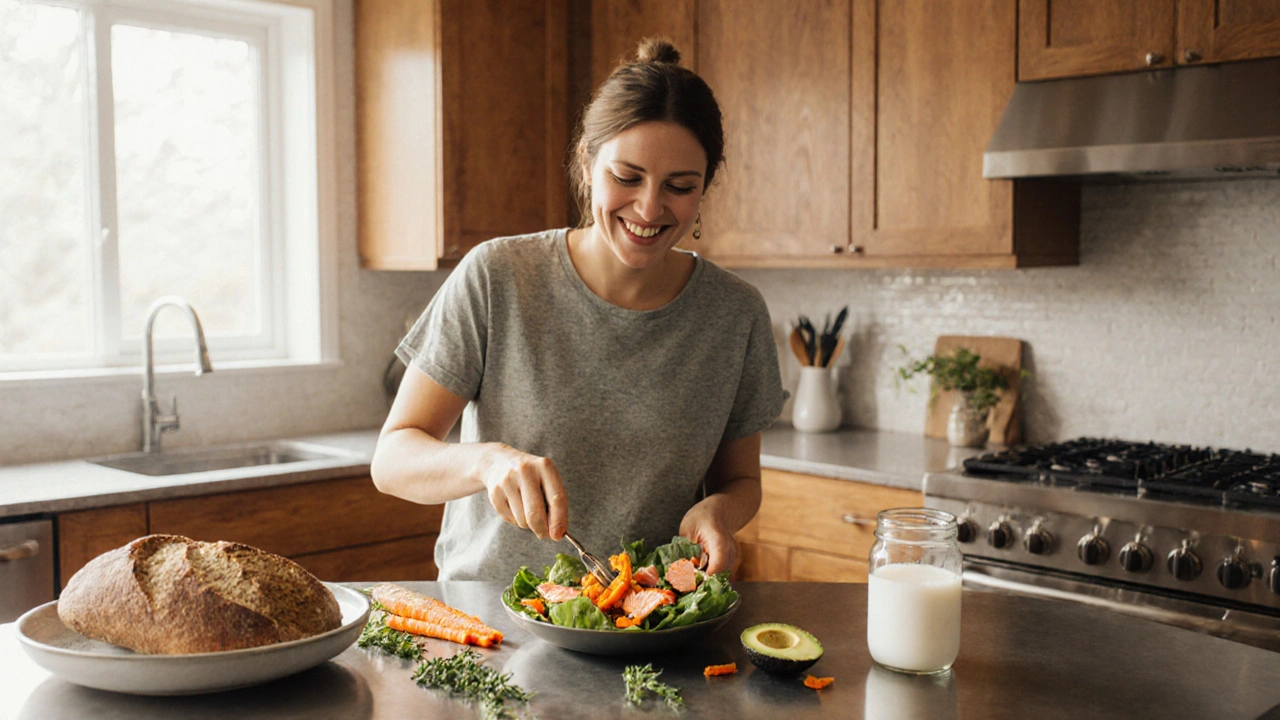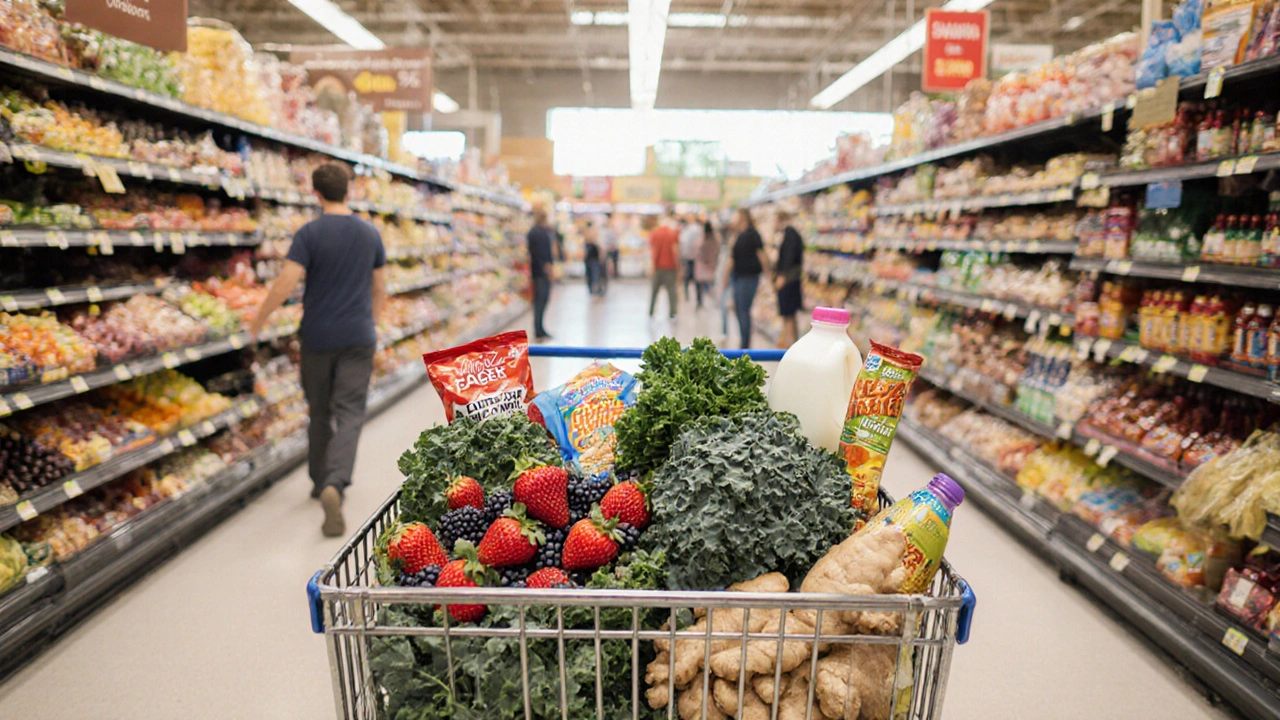Colitis Diet Guide: Best Foods to Eat & Foods to Avoid
 Sep, 28 2025
Sep, 28 2025
When you hear the term colitis is a chronic inflammation of the colon that can cause cramps, diarrhea, and fatigue, you might think medication is the only solution. In reality, what you put on your plate can either calm the flare‑ups or fan the flames. This article breaks down the science, lists the foods that soothe, flags the triggers, and gives practical tips to turn your kitchen into a healing space.
Key Takeaways
- Low‑residue and easily digestible foods reduce bowel movements and abdominal pain.
- Probiotic‑rich items help restore a balanced gut microbiome.
- Avoid high‑fiber, spicy, and certain dairy products during active flare‑ups.
- Keeping a food diary reveals personal triggers faster than trial‑and‑error.
- Consult a dietitian for a tailored plan, especially if you have nutrient deficiencies.
How Diet Impacts Colitis
The gut lining in colitis is already compromised, making it more permeable to irritants. Certain nutrients can:
- Modulate inflammation - omega‑3 fatty acids and antioxidants calm immune responses.
- Feed probiotics beneficial bacteria that compete with harmful microbes, helping the colon heal.
- Alter stool consistency - soluble fiber a type of carbohydrate that dissolves in water and forms a gel can either bulk up stools (when insoluble) or soften them (when soluble).
When you eat foods high in gluten a protein found in wheat, barley, and rye or lactose, the colon may react with extra gas and cramping, especially if you’re sensitive. The goal of a colitis diet is to supply calories and nutrients without aggravating the inflamed tissue.
Foods to Embrace
These choices are generally well‑tolerated and can aid recovery:
- Lean proteins: skinless chicken, turkey, and fish (especially salmon for omega‑3s).
- Low‑residue vegetables: well‑cooked carrots, peeled zucchini, and spinach.
- White rice and peeled potatoes: provide carbs without the bulky fiber of whole grains.
- Probiotic foods: plain yogurt (if lactose‑tolerant), kefir, and fermented tempeh.
- Ripe bananas and applesauce - gentle sources of soluble fiber.
- Healthy fats: olive oil, avocado (in small amounts), and nut oils.
Foods to Skip or Limit
| Eat | Avoid |
|---|---|
| Boiled chicken, turkey, fish | Fried meats, processed sausages |
| Cooked carrots, peeled zucchini | Raw cruciferous veg (broccoli, cauliflower) |
| White rice, plain pasta | Whole‑grain breads, high‑fiber cereals |
| Plain yogurt, kefir (if lactose‑tolerant) | Full‑fat cheese, ice cream |
| Ripe bananas, applesauce | Unripe fruits, high‑sugar fruit juices |
| Olive oil, avocado oil | Butter, margarine with trans fats |
| Herbal teas (peppermint, ginger) | Spicy sauces, hot peppers |
| Low‑FODMAP nuts (almonds, macadamia) | High‑FODMAP legumes (beans, lentils) |
Why these foods? Spicy foods contain capsaicin, which can irritate the intestinal lining and trigger cramps. High‑FODMAP items ferment in the colon, creating excess gas that worsens bloating. Dairy can be a problem because many colitis patients develop secondary lactose intolerance.

One‑Day Sample Meal Plan
- Breakfast: Scrambled egg whites with a drizzle of olive oil, a slice of white toast, and a small bowl of applesauce.
- Mid‑morning snack: Plain kefir (if tolerated) with a ripe banana.
- Lunch: Grilled salmon, mashed peeled potatoes, and boiled carrots seasoned with a pinch of salt.
- Afternoon snack: A handful of macadamia nuts and herbal ginger tea.
- Dinner: Baked chicken breast, white rice, and sautéed spinach (cooked until very soft).
- Evening snack: Lactose‑free yogurt with a drizzle of honey.
Adjust portion sizes based on your appetite and energy needs. The aim is steady, easily digestible calories throughout the day.
Practical Tips for Sticking to Your Plan
- Keep a food journal: Note what you ate, symptom severity, and timing. Patterns emerge fast.
- Cook or steam everything: Raw textures are harder on an inflamed colon.
- Stay hydrated: Aim for 1.5-2 liters of water daily; herbal teas count.
- Mind the fat: Too much even healthy fat can delay gastric emptying and cause discomfort.
- Re‑introduce foods slowly: After a flare subsides, add one new item every 3‑4 days to gauge tolerance.
When to Seek Professional Guidance
If you experience persistent weight loss, anemia, or vitamin deficiencies, a registered dietitian specialized in inflammatory bowel disease can tailor a plan that meets your nutritional gaps. Sometimes a short‑term supplement (e.g., iron, vitamin D) is necessary while you heal.
Frequently Asked Questions
Can I eat whole grains if I have colitis?
During active flare‑ups, high‑fiber whole grains can increase stool bulk and cause cramping. Stick to refined grains like white rice or white bread until symptoms improve, then gradually test small portions of low‑FODMAP whole grains.
Are probiotics really helpful for colitis?
Research shows certain probiotic strains (e.g., Lactobacillus rhamnosus and Bifidobacterium longum) can reduce inflammation and improve remission rates. Choose a clinically tested product and discuss dosage with your doctor.
Is a low‑FODMAP diet the same as a gluten‑free diet?
Not exactly. Low‑FODMAP restricts fermentable carbs like fructose and lactose, while gluten‑free eliminates the protein gluten. Some foods overlap (e.g., wheat), but each diet targets different triggers.
Can I drink coffee or tea?
Caffeine can stimulate the gut and worsen diarrhea for some people. If you’re sensitive, switch to low‑caffeine herbal teas like chamomile or peppermint, which also soothe the stomach.
What should I do if I accidentally eat a trigger food?
Drink plenty of water, avoid additional irritants, and consider an over‑the‑counter anti‑diarrheal (e.g., loperamide) only after consulting your physician. Track the reaction in your food journal to confirm the trigger.
Shelby Larson
September 28, 2025 AT 10:32Honestly, the majority of people ignore the simplest dietary changes while chasing expensive meds. It is morally indefensible to perpetuate that ignorance, especially when the science is clear. Low‑residue foods are not a suggestion; they are a necessity for colitis patients. You must prioritize gut‑healing nutrients over fleeting taste pleasures. The consequences of neglect are severe, and you cannot excuse that with "personal preference".
Uju Okonkwo
October 3, 2025 AT 01:39Hey everyone! I want to emphasize that each body reacts differently, so keep a food journal and note your symptoms. Start with the gentle foods listed-lean proteins, white rice, and cooked carrots-then gradually test small amounts of new items. Remember to stay hydrated with herbal teas; they can soothe the gut. If you ever feel overwhelmed, reach out to a dietitian for personalized guidance. You’ve got a supportive community here, so don’t hesitate to share what works for you.
felix rochas
October 7, 2025 AT 16:46Seriously??? The pharma industry doesn't want you to know that the real trigger is the hidden chemicals in processed foods!!! They push high‑fiber “healthy” options to keep you dependent on meds!!! Stick to the guide and avoid their propaganda; it’s a conspiracy to keep you sick!!!
Emmons Kimery
October 12, 2025 AT 07:52Whoa, let’s keep things calm. 🌿 I understand the frustration, but blaming the entire industry isn’t helpful. The diet plan here is solid and evidence‑based; try implementing it step by step. If you need a listening ear, I’m here. 😊
Mimi Saki
October 16, 2025 AT 22:59Knowing you’re not alone in this journey makes all the difference. Keep experimenting with the suggested foods and celebrate each small victory. Your body will thank you for the patience and care you give it.
Subramaniam Sankaranarayanan
October 21, 2025 AT 14:06Let me set the record straight: the avoidance of whole grains isn’t a personal preference; it’s a physiological necessity during flares. High‑FODMAP items cause excessive fermentation, leading to gas and bloating. Moreover, the immune response to gluten can exacerbate inflammation. Follow the low‑residue guidelines until your mucosa stabilizes, then cautiously re‑introduce fibers.
Kylie Holmes
October 26, 2025 AT 04:12Stay strong, you got this!
Asia Lindsay
October 30, 2025 AT 19:19Great rundown! 🌟 I’d add that prepping meals in batches can save time and reduce stress. Keep your spices mild and focus on herbal teas for extra soothing effects. You’re doing amazing work on your gut health!
lorna Rickwood
November 4, 2025 AT 10:26What is the essence of food if not a fleeting whisper of existence? Its texture speaks louder than its name, yet we never listen. The table becomes a mirror of the mind, reflecting our hidden cravings. When you eat, you are both creator and destroyer, a paradox that fuels the soul. Consider this as you choose your next bite.
janvi patel
November 9, 2025 AT 01:32I see the points made, but I think the emphasis on avoiding all dairy is overstated. Some patients tolerate low‑lactose options just fine.
Rin Jan
November 13, 2025 AT 16:39First, let me say how deeply I empathize with anyone battling colitis; the daily uncertainty can feel like a storm cloud that never lifts. Yet, it is crucial to recognize that the diet outlined here is not merely a suggestion but a lifeline. By committing to low‑residue foods, you reduce mechanical irritation and give the colon a chance to mend. The inclusion of omega‑3 rich salmon is scientifically proven to modulate inflammatory pathways, a fact many overlook in their haste for quick fixes. Probiotic sources such as kefir help re‑populate the gut with beneficial bacteria, forming a protective barrier against pathogenic overgrowth. Hydration, often underestimated, plays a pivotal role in maintaining stool consistency and preventing further electrolyte imbalances. Careful re‑introduction of fibers, after the flare subsides, ensures that you do not shock your system with sudden bulk. The practice of keeping a detailed food journal cannot be overstated; patterns emerge that are invisible to the naked eye. I encourage you to chronicle not only what you eat but also the timing of symptoms, sleep quality, and stress levels. When you see a correlation, you empower yourself with knowledge that no medication can provide. Moreover, seeking out a registered dietitian specialized in inflammatory bowel disease introduces a personalized touch that generic guidelines lack. They can identify micronutrient deficiencies early, preventing long‑term complications such as osteoporosis or anemia. Don’t hesitate to ask about supplemental vitamins if your diet falls short. Most importantly, maintain a hopeful attitude; your body has an incredible capacity for repair when given the right tools and environment. Celebrate small milestones, like a day without cramping, because each victory builds resilience. Finally, share your experiences; you might become the beacon of hope for someone else navigating this challenging journey.
Jessica Taranto
November 18, 2025 AT 07:46Interesting point about the probiotic strains!; could you elaborate on the specific dosage ranges that have shown efficacy in clinical trials? Also, have you considered the impact of prebiotic fibers in conjunction with these probiotics?; I think a combined approach could offer synergistic benefits.
akash chaudhary
November 22, 2025 AT 22:52First, the prior comment contains multiple factual inaccuracies. The probiotic dosage cited must be at least 10^9 CFU; anything less is ineffective. Secondly, the suggestion to “gradually re‑introduce” fibers ignores the fact that certain soluble fibers can exacerbate diarrhea if not monitored. Lastly, any claim that herbal teas are “soothing” lacks empirical evidence; they are merely placebo. Stick to evidence‑based protocols.
Adele Joablife
November 27, 2025 AT 13:59While the guide is thorough, I find the tone a bit condescending toward readers who might not grasp the nuances immediately. Empathy should accompany instruction, especially for those feeling vulnerable.
Joy Luca
December 2, 2025 AT 05:06From a clinical nutrition perspective, the macro‑nutrient distribution outlined optimizes glycemic load and minimizes osmotic diarrhea. The low‑FODMAP paradigm, when applied judiciously, reduces fermentable substrate availability, thereby attenuating colonic gas production. This approach aligns with current consensus guidelines and enhances mucosal healing trajectories.
Jessica Martins
December 6, 2025 AT 20:12The advice presented is clear and concise, adhering to current dietary recommendations for colitis management. Maintaining precise portion sizes and monitoring symptom response will be beneficial.